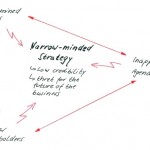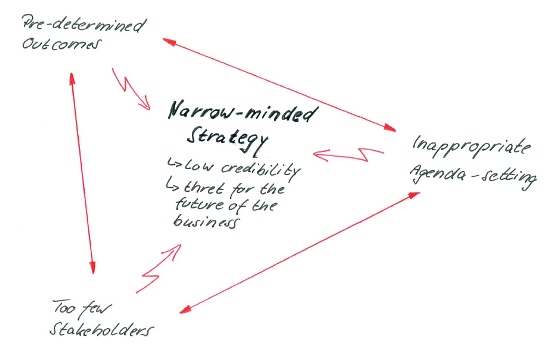Half of strategic planning is a craft that can be learnt. The other half consists of the working styles, experiences and personal attitudes of the key people involved. This is where the problems may start: Personal working styles and attitudes tend to be full of biases as well as of intentional and unintentional misjudgments.
Read how these can team up with typical problems in strategic planning processes in order to lead to disaster.
Much has been written about barriers to strategic planning. Researchers have discussed them and have proposed solutions. I’d like to pick out just three problems that are closely interrelated and mutually reinforcing. These are
- Pre-determined outcomes,
- Too few stakeholders involved, and
- Inappropriate agenda setting
(Problems 1 and 2 are from Richard Marker’s Why Strategic plans fail and 3 is from Oliver Recklies’ Overcoming arriers to strategic planning)
1 Pre-determined outcomes
Some CEOs already know what strategy they want to pursue. Just to be sure, they tell their strategy planner what result they expect from the process. Of course, the prudent strategist – be it an internal one or an external strategy consultant – would reject such a request. However, in most cases there will be somebody who does what he was told.
2 Too few stakeholders involved
It is good advice to involve those people in the strategic planning process who have to endorse and implement the strategy. Otherwise, you put at risk not only the credibility of your results, but also the successful development and implementation of your strategy.
3 Inappropriate agenda setting
This happens when the agenda for the strategic planning meeting is set only by the top management team. As with the narrow selection of stakeholders, you risk to miss out some important issues that might influence your strategic choice.
It becomes evident, that these three problem areas mutually influence and reinforce each other:
- CEOs who have explicitly or implicitly pre-determined the outcomes of the strategy process probably tend to set an agenda and invite stakeholders that fit their image of the strategy of choice
- An insufficient number of stakeholders involved will have insufficient impact on the agenda and will provide insufficient input to the strategy process. Their selection also predetermines the outcome of this process.
- An inappropriate agenda addresses too few or the wrong stakeholders. Chances are that it leads to inappropriate outcomes.
Businesses that allow these forces to become effective and mutually reinforcing will hardly get any new ideas from their strategy processes.
I won’t give any advice on how to overcome these barriers here, since this is common sense.
Suffice it to say: if you discover just one or two of these problems in strategic planning in your company,
- Watch out, the other ones probably are not far away
- Give some serious thought to the quality of your businesses strategy
Are you in a position to change something about that?



Pingback: Overcoming barriers for strategic planning | Eddielogic